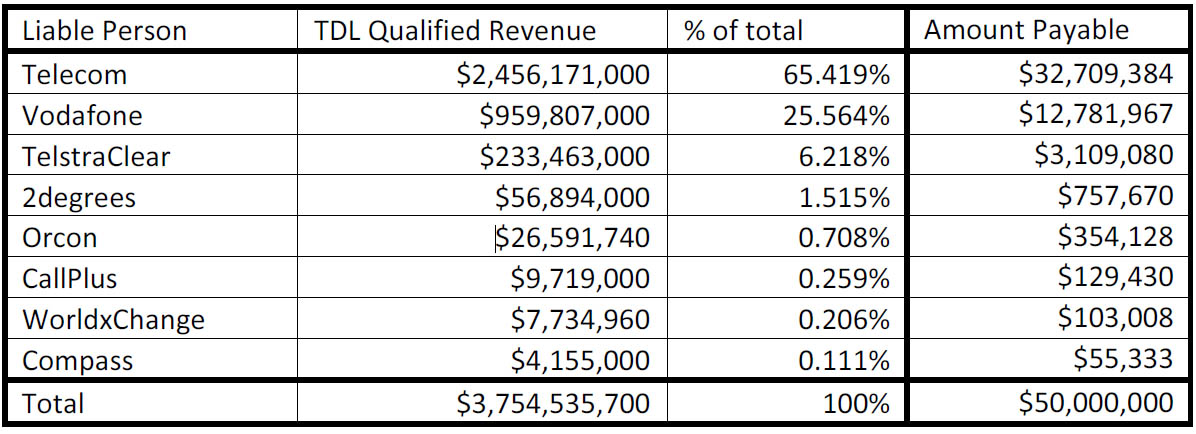Sky TV, Skype and other "over-the-top" content and service providers have escaped the government’s new Telecommunications Development Levy (TDL) which will extract $50 million a year from the industry.
In an early discussion paper, the Commission raised the possibility that Sky TV – whose new iSky service works over broadband – could be included in the levy.
The Commission today also revealed that Telecom, Vodafone and 2degrees had called for "over the top” content providers like Sky and Skype to pay a share of the $50 million annual fee.
However, Sky TV was left off the draft list of qualifying companies and, as expected, is not on the final list either (see the full list of 29 liable companies end of article).
The Commission said over-the-top content providers such as Sky TV were not liable, because they did not operate a component of a public telecommunications network in NZ.
Tuanz disagrees
Earlier, Telecommunications Users Association CEO Paul Brislen told NBR that Sky TV and others in a similar position should have been a target for the levy.
"Companies that make money via the network should be helping to fund the network," Mr Brislen said.
One qualifying criteria, under the Telecommunications Act, was that a company must have made $10 million gross revenue from telecommunications services – unlikely in the case of the nascent iSky, which Sky TV has taken a cautious approach to promoting as it tweaks the service.
In any case, the Commission determined that content revenue was not liable, in keeping with its broader interpretation that it was not the Telecommunications Act's intention to "bring about fundamental change" by targeting content providers and over-the-top services such as Skype.
Chorus snagged
Chorus is included in the Commerce Commission’s final list of companies likely to be liable.
“Most parties agreed with the Commission’s position on Chorus’ liability for the 2011/12 financial year, with the notable exception being Chorus,” the Commission dryly notes in its final determination.
As a wholesale and network operating company rather than a retail service provider, the Telecom spin-off had hoped to escape the levy. Chorus (which listed in November) has also argued that the timing of its incorporation as a standalone business should have exempted it this year.
The three local fibre companies or wholesale network operators under the government’s $US1.35 billion Ultrafast Broadband (UFB) project – North Power, Ultrafast Fibre and Enable – have also been deemed liable.
Other wholesale and network operators including Kordia, FX Networks, and Optus and Verizon (part owners of the 50% Telecom-owned Southern Cross Cable, which is not liable) are also snagged as the government, empowered by the Telecommunications Amendment Act (2011), throws a much wider net than it did for the earlier Kiwishare levy.
More curiously, IT services and cloud computing company Datacom and state-owned Crown Fibre Holdings (the government's invest and managment vehicle for the UFB) are also caught in the net (see full list end of article).
Content delivery networks not liable
In another key ruling, the Commission determined that content delivery networks (CDNs) - or "dumb caches" as it refers to them in parts of its notification - were not part of a public telephone network and therefore not liable.
A CDN - such as that run by Kordia's Orcon for Sky TV's iSky service - stores copies of content in multiiple locations, the better to move it closer to consumers to improve download performance.
Where the money is going
The Telecommunications Development Levy replaces the old Kiwishare Levy, which was used to subsidise Telecom’s service to non-commercial rural customers.
Funds from the new TDL will initially be channeled toward the $300 million, six-year Rural Broadband Initiative or RBI.
Chorus (then as part of Telecom) and Vodafone won the RBI in a joint bid.
As with the old Kiwishare levy, there will be a degree of money-go-round.
Chorus and Vodafone will contribute to the $50 million annual levy, but will also then get their money back to spend on the RBI.
But the big question will be how much Chorus (still part of Telecom until November last year) will have to kick in as a standalone entity.
And how much Telecom, TelstraClear, 2degrees will object to their allocations, once those are calculated by the Commission (the regulator has yet to release a timetable).
The 2010/2011 TDL breakdown looked like this (click to enlarge):

The 29 companies identified as likely to be liable for 2011/2012:
-
Actrix Networks Ltd
-
Airnet NZ Ltd
-
Bay City Communications Ltd
-
CallPlus Ltd
-
Slingshot Ltd
-
Chorus New Zealand Ltd/Chorus Ltd
-
Compass Communications Ltd
-
Crown Fibre Holdings Ltd
-
Whangarei Local Fibre Company Ltd
-
(Northpower Ltd)
-
Ultrafast Fibre Ltd
-
(Waikato Networks Ltd)
-
Datacom Systems Ltd
-
Enable Networks Ltd
-
FX Networks Ltd
-
Gisborne.net
-
Inspire Net Ltd
-
Kordia New Zealand Ltd
-
Orcon Ltd
-
Maxnet Ltd
-
Network Tasman Ltd
-
Optus Networks Pty Ltd
-
Snap Internet Ltd
-
Teamtalk Ltd25
-
Araneo Ltd
-
Citylink Ltd
-
Telecom Corporation of New Zealand LTD/Telecom New Zealand Ltd
-
TelstraClear New Zealand Ltd
-
thepacific.net Ltd
-
Transpower New Zealand Limited
-
Trustpower (Kinect) Ltd
-
Two Degrees Mobile Ltd
-
Vector Communications Ltd
-
Verizon New Zealand Ltd
-
Vodafone New Zealand Ltd
-
Woosh Wireless Ltd
-
WorldxChange Communications Ltd
-
CallPlus
RAW DATA: Read the Commission's full July 24 final TDL allocation notice (PDF)
Chris Keall
Tue, 24 Jul 2012



